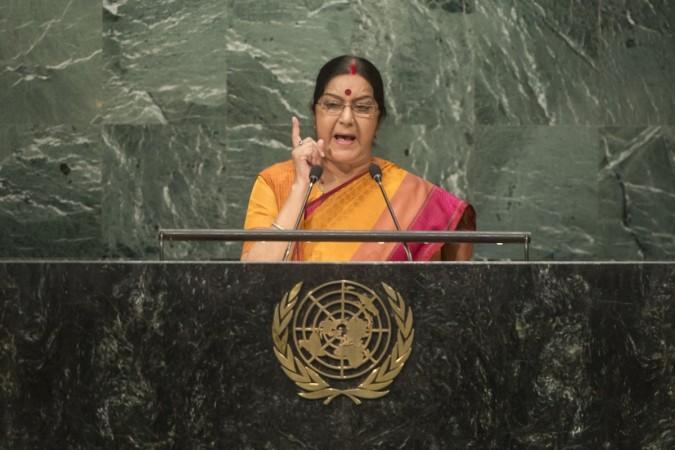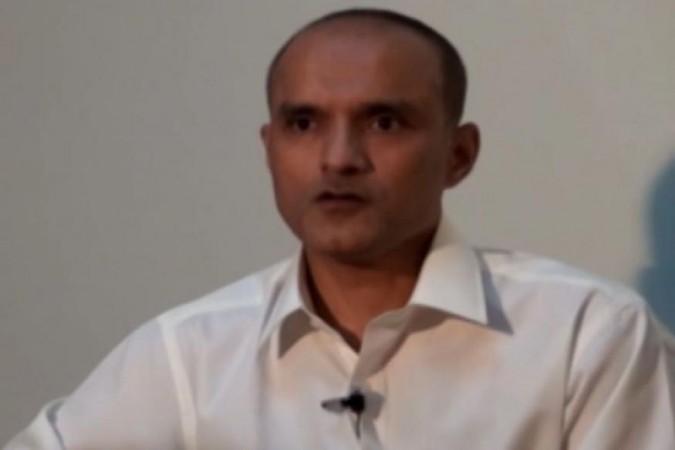
External Affairs Minister Sushma Swaraj on Monday ruled out the possibility of any meeting between Prime Minister Narendra Modi and his Pakistani counterpart Nawaz Sharif when they visit Kazakhstan this week. She also reiterated India's stand that Pakistan cannot take the Kashmir issue to the International Court of Justice (ICJ) and that the matter can only be "resolved bilaterally."
"No meeting is scheduled either from their side or from our side," Swaraj told reporters at a press conference held to mark the completion of three years of the Modi government. Both Modi and Sharif are scheduled to attend the Shanghai Cooperation Organisation (SCO) Summit at Astana in Kazakhstan on June 8-9 this year.
The external affairs minister also took a tough stand on India's ties with Pakistan and said that "talks and terror cannot go together."
Pakistan cannot take Kashmir issue to ICJ
On the Kashmir issue, Swaraj said, "Pakistan cannot take Kashmir issue to ICJ. The Shimla agreement and Lahore declaration are very clear on Kashmir issue that it can only be resolved bilaterally. The two countries are bound by these bilateral agreements." Her remarks came in response to a question about a Pakistani law officer's statement that the Kashmir issue could also be taken to the ICJ after India approached the global court in the Kulbhushan Jadhav case.
Swaraj rejected suggestions that the Centre followed a "flip- flop" policy when it came to dealing with Pakistan. She clarified that India "wants to hold dialogue, resolve all issues bilaterally without mediation from any third country, organisation or anyone else. But at the same time terror and talks cannot go together."
Swaraj also said that India has asked other countries to see if international terrorism is, in any way, linked with terrorism spreading out of Pakistan. "Finally, where was Osama bin Laden found? In Pakistan," she said. Swaraj added that it was high time the Comprehensive Convention on International Terrorism at the UN was finalised and terrorism defined.
India will win Jadhav's case

When asked about Pakistan's statement that it would raise jurisdiction on the merit of Jadhav's case, Swaraj said that India will win the case as it has a strong argument against the death sentence meted out to the alleged Indian spy by a Pakistani military court in April this year.
Swaraj also reiterated that India filed a case against Pakistan based on its violation of the provisions of the Vienna Convention, which clearly state that consular access to the Indian national is not only "essential but compulsory."
Jadhav was sentenced to death in April this year after the Field General Court Martial found him guilty of "espionage and sabotage activities" in Pakistan. The neighbouring country has claimed that Jadhav was arrested in Balochistan province by security forces on March 3, 2016, after he entered the territory from Iran.
However, India refuted those claims saying that Jadhav was abducted from Iran when he visited the country for business purposes after retiring from the Indian Navy. Swaraj had also warned Pakistan that Jadhav's execution would amount to "pre-meditated murder" and that the neighbouring country should "consider its consequences" on bilateral relations.
India had also demanded a certified copy of the verdict and the charge sheet in order to appeal against the army court's verdict. Several bilateral talks were cancelled or postponed by India in response to Jadhav's death sentence. India made 16 requests to Pakistan to grant consular access to Jadhav but all requests were denied by the Pakistani administration, following which it approached the International Court of Justice. The ICJ on May 18 stayed Jadhav's death sentence.








